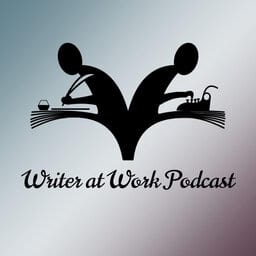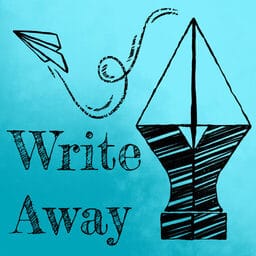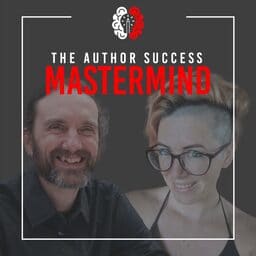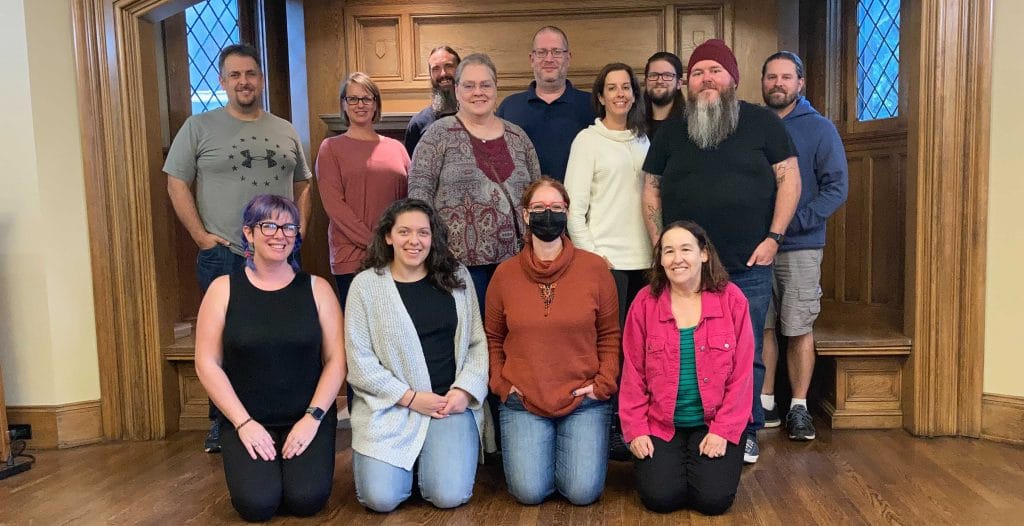A curated collection of the latest and most interesting podcast episodes about the author life.
With daylight savings and my poor planning skills, my life has been a little upside down this week. I managed, yet again, to schedule my life into one crazy week of the month. If you are anything like me…
Waiting until the last minute to do something.
ADHD giving you excuses to put things off?
The idea that you still have time, you can do it tomorrow.
Well…You’re not alone. It might seem like it, but in truth, there are many of us out there. Finding a balance between your life and all the things you want to do, is important. Here are a few of the podcasts that have helped me get back on track this week.
Top 3 Must-Listen Episodes
Six Figure Author // SFA 124- Scheduling vs Winging It: Which is More Sane for Your Author Career?

Lindsay Buroker, Jo Lallo, and Andrea Pearson go over the type of schedule they use in their life for writing. Jo and Lindsay are both hybrids while Andrea works well on her own time frame.
Jo breaks it down into three different types that are based on the type of person you are. Personality will play a big role in which of the three types fit you.
Strict Scheduling: This is where you know the entire schedule from creation to book launch.
Pros for this type:
- You can become a factory that produces and gets things out to your readers at a consistent time.
- You are able to book things with professionals you might want to work with but need to be fitted into a time slot for them.
- Maximizes preorders protentional.
- Minimizes unforeseen delays because everything is booked from editor to cover designer.
- This is amazing for people who need steady deadlines and goals to meet each step of the way. Or people need to have control over every step of the process.
Cons for this type: - Once the plan is all set, it’s very difficult to shift it.
- It becomes hard to fit time for side projects on the side.
- Too much planning ahead can hurt the memory of what happened in the book when it comes to marketing.
- If you miss a deadline, it can burn bridges and lose your contact with them.
- If someone along the line becomes sick or has an emergency it can disrupt the whole system.
Just in Time Scheduling: This is where you go with the flow. Once you finish a part you schedule the next part of your work.
Pros for this type:
- The flexibility is great for parents, those with multiple jobs, and busy schedules.
- There are no deadlines to stress about.
- Let’s you finish one part before starting the next piece.
Cons for this type: - You will be held up by the availability of other people.
- Some professionals won’t have time openings for you to work with them.
- Expectations not being met can cause you to give up and feel like you are never getting anywhere.
- There’s no pressure or deadline to help you reach a time frame of completion.
Hybrid Scheduling: You do a mixture. Some things will be set in stone to give some deadlines and others will be left up when the step before is finished.
Pros for this type:
- This gives you some deadlines with wiggle room between those times.
- If you are doing side projects you can have a different set of professionals working with you than your normal go-to editor for example. You can look for one that specifies.
- Allows you to be gentle with yourself in a busy life while still having a focus on getting this done.
Cons for this type: - If your work is shifting (an example used is word count with editors) the professionals you work with might not be able to take on the new direction.
- You might miss promotions if you don’t have things planned out.
- You’re muse can wonder making you stress suddenly when a deadline looms. Another important detail all three agree on is…drumroll, please…when should you preorder. They were able to narrow it down to two important questions:
Should I do a long preorder?
This is when you have yet to start the book or are still writing draft one and put out a book order for people to start getting your book. And here are the main points to think about before you choose to do this: - This will set a deadline that you must meet (some places will give you a fine if you miss the date of the preorder).
- It lets readers know that you are writing the book and it will be out soon.
- If your life is constantly hectic and throws wrenches at you, this might not be the method to use.
Should I do a short preorder?
This is where you have a manuscript finished and are ready to get the cover and the last edits. Maybe you have it all done already and you want to bring some hype to your book. - Make sure your preorder is longer than one week in order to get the promotions out there for preorders.
- They recommend using a short preorder for book one in a series to get people in reading it and then have longer ones for the next books to build hype.
- If you are a person who doesn’t want deadlines or has a very busy life, this is a better way to build some hype right before the launch. The type of preorders you like to use will help you think about the type of schedule that would work best for your book writing life.
Writer at Work Podcast // March Mini Episodes

There are a total of three mini-episodes totaling up to about 15 minutes long. This month the theme was all about different writing careers.
The first mini-episode is Writing Memoir with Valerie Ihsan. She goes over the big difference between memoirs and autobiographies. Memoirs are from the memories of the person writing them. It’s a chunk of their life they are putting on the page, not their entire life. Biographies are written by other people about the person in the book. She believes the best part about writing a memoir is that it’s a great opportunity to learn about yourself. The hardest part is turning the memories into a literary setting. Valerie goes on to explain that it’s important to just write the book and not worry or let that fear hold you back.
The second mini-episode is Writing for Middle Grade with S.A. Schneider. He explains that middle-grade writing is not a genre but a demographic, following children from 5th to 9th grade depending on their reading level. He explains that he knew he wanted to write for this group because he was able to step into the minds of kids and remember what it was like to read adventures. The hardest part of writing for this demographic is the marketing side. It’s not easy to market to parents to get the books for children. The use of teachers, librarians, and other children is the best way to get the book out there for readers.
The final mini-episode is Freelance Writing with Allie Racette. She primarily does copywriting for her clients and dabbles in social media posts and graphic design. Allie explains that it’s hard to find steady writing jobs that pay. She writes her own books on the side but hasn’t published them so the income isn’t there yet. The best thing is that she has flexibility in what jobs she will take on and the time frame to get them done in. On the flip side, she warns people to make sure they stay on top of things since the flexibility can also make it seem like you have more time than you really do. For anyone starting out, she recommends that you take the jobs offered to you. Getting recurring clients takes a bit and building trust with people will lead them to encourage others to find you.
Write Away // Episode 83: Maslow’s Hierarchy of Needs

JP and Crys go over Maslow’s Hierarchy. A pyramid formation that starts with the basic needs for survival and then moves up into needs for growth. Each section must be met in order to move up.
They both go over how this pyramid doesn’t work with the reality of the complex human mind. There will be times that people put others above their own needs. This is prevalent in real life and in books. The fact that Maslow took concepts from an indigenous group, twisted their teachings, and then profited off it also bothers them.
Crys brings up the fact the Hierarchy only takes into account the individual’s needs and not the community. It gives off the idea that humans are generally greedy creatures that only think of themselves. The study was done on people who lived and thrived as a community and tried to force their understandings into European culture.
Instead of focusing solely on one method to help establish what your characters might need to survive, they came up with several other examples to broaden the writer’s mindset.
Manfred Max-Neef proposed that human needs were intergraded with each other. If something went wrong in one it could affect all the others. The same can be said for something being good happening; it could bring all the others up. There are even times when fulfilling one need leads to failing at another. It’s a closer representation of the human experience and allows writers to be able to create deeper characters.
In JP fashion, he has been able to look out how Manfred’s classification (nine pillars) could be related to the theme. He uses “The Road” and the “Handmaid’s Tale” to show how the theme can be tied into the basic needs of people and how complicated those needs can make the story. His recommendation is to pick the main two or three pillars that affect the needs of the character and see how they can affect the story. The theme will be found there and will help propel the story forward.
The Latest from The Author Success Mastermind Podcast
54: What is genre?

This week authors J. Thorn and Crys Cain discuss the question “what is genre” and why it matters when writing, publishing, and marketing your books.
The Wildcard: Interesting Episode from a Non-Writing Related Show
Office Politics: The Anti – #GIRLBOSS Podcast // Instagram Vs Reality: Freelance Life & Solo Entrepreneurship

Jazmine Reed-Clark talks about her shift from working for others to working for herself. She had expectations and did research before making the jump. Still, there are a few things that Jazmine wasn’t ready for that social media gave a pretty filter to. She breaks down the social media representation of the glamor presented from taking a side hustle into a full-time business.
Here’s the reality behind the Instagram posts:
“I have so much free time.”
The Line between life and work becomes blurred. It’s hard to put the work down when it’s all around you. There aren’t paid vacations and time off. The hustle culture makes many feel like they should be working even when they are sick and would’ve called into a job.
“I am paid to do what I love.”
While you are paid to do your passion, there is still a lot of work that goes into getting the money. There’s a whole business side to the passion that needs to be operated that doesn’t get shown on social media. To make ends meet many people will need to take on clients they aren’t passionate about when getting started. Getting people to pay you on time is difficult too.
“I get to be my own boss.”
While you can set up things for yourself and hold yourself responsible, the clients are still just as demanding as a boss. While a boss you could talk to about something going on or needing time off, most of the time there isn’t as close of a connection with the clients.
“I don’t have the office politics or fears anymore.”
With the business always on your mind, it can be hard to break away from the worry of meeting a deadline, getting the next client, or what the next quarter will be like. Securing the business and clients takes over the office political worry.
Jazmine wants to make sure that people are looking into and getting ready for the idea of taking on a business. And to not fall into the trap of pretty filters on Instagram.
Inside The Author Life
Don’t forget to look at your schedule and make time for yourself. You are just as important as your business or book.

Get the APB delivered straight to your inbox!
Need some help with your story?
Three Story Method certified editors are standing by, ready to help you become a better writer. Click on our picture or visit https://theauthorlife.com/editing/ for more details!
Posted in Author Podcast Broadcast


